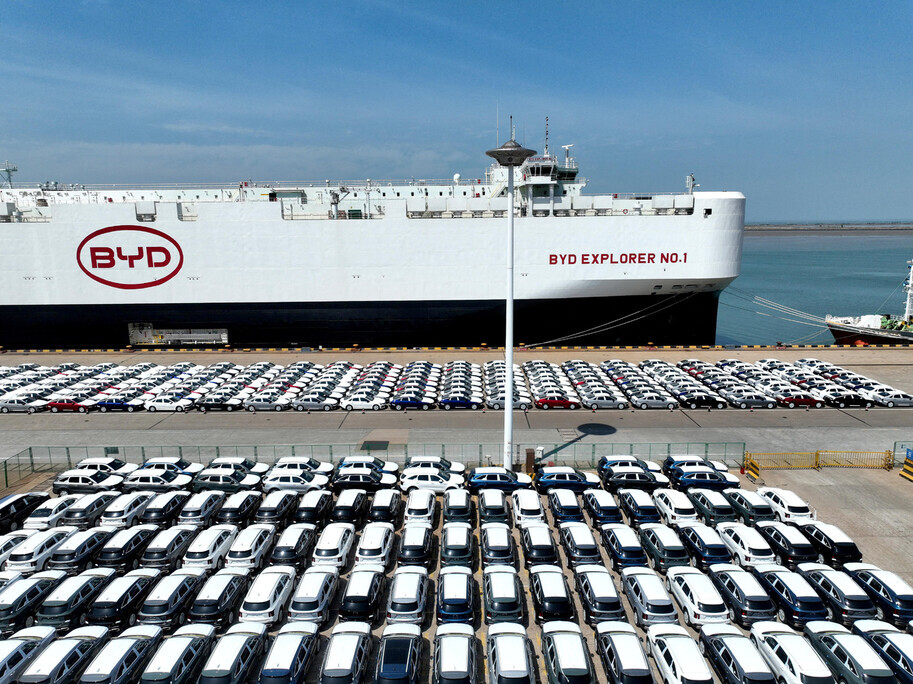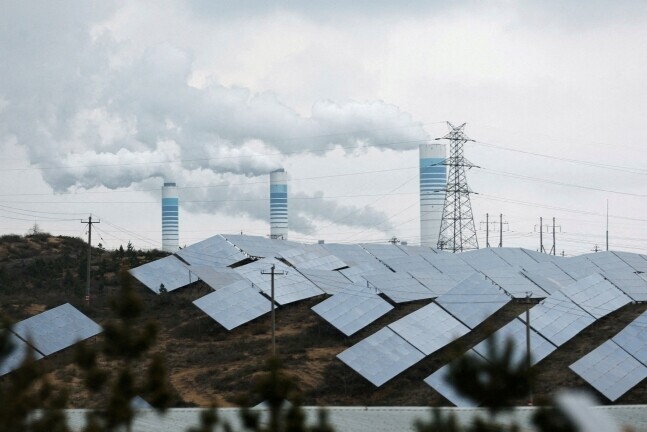hankyoreh
Links to other country sites 다른 나라 사이트 링크
At heart of West’s handwringing over Chinese ‘overcapacity,’ a battle to lead key future industries

China’s rapid growth in the green tech sector, which includes industries such as electric vehicles, batteries and solar, is ushering in criticism of “overcapacity” from the US and Europe. Following sanctions on high-tech industries such as semiconductors and artificial intelligence, and so-called derisking policies, the confrontation between the US and Europe versus China seems to be expanding to include competition over green industries, key industries for the future.
Heated debates over China’s overcapacity of EVs, solar panels and more
Sanctions against China’s green industries were first announced by the European Union in the second half of 2023. In October 2023, the EU launched an anti-subsidy investigation into the imports of electric vehicles from China, saying it would “determine whether battery electric vehicle (BEV) value chains in China benefit from illegal subsidisation and whether this subsidisation causes or threatens to cause economic injury to EU BEV producers.”
This move toward sanctions came as Chinese electric vehicles, which are more than 20% more affordable than their European counterparts, began to enter the European market in earnest.
Since the beginning of 2024, the US has started to sing the same tune as the EU. At the same time, it has also widened the scope of its target.
At the beginning of April, before her trip to China, US Secretary of the Treasury Janet Yellen said that the US is “trying to nurture an industry in, for example, solar cells, electric batteries, electric vehicles, and these are actually all areas where we think that massive investment in China is creating some overcapacity.” By singling out the three sectors in green tech, she firmly stated Washington’s resolve to counter China’s “overcapacity.”
The US is also preparing to launch a full-scale response against China’s steel and traditional industries such as shipping, logistics and shipbuilding, citing suspected unfair practices.
China has repudiated these claims and pushed back sharply. The country argues that its comparative advantage in these industries is a natural economic phenomenon.
“China’s electric vehicle companies rely on continuous technological innovation, perfect production and supply chain system and full market competition for rapid development, not relying on subsidies to gain competitive advantage,” Chinese Commerce Minister Wang Wentao said during a visit to France earlier in April, adding that US and European assertions of overcapacity were groundless.
China also insists that its EVs and solar panels are not yet at the stage of overcapacity and that more production is needed in the long run. It also argues that the US, Europe and other Western industrialized nations are being hypocritical in their accusations lobbed at China, as those countries are pouring in huge subsidies to promote their own semiconductor and green industries.
On Friday, China passed a new tariff law that allows the country to hit back if its trade partners impose tariffs. Article 17 of the new law stipulates that China can adopt the “principle of reciprocity” against markets that have signed preferential trade deals with China if such markets impose high tariffs.
The rapid growth of China’s green tech has prompted much alarm in the US and Europe. For more than a decade, China has made concerted efforts to develop its electric vehicle, battery and solar industries.
According to the International Energy Agency, 8.1 million EVs, or 58.7% of the world’s 13.8 million EVs sold in 2023, were sold in the Chinese market, while China exported 1.23 million EVs, or 8.7% of total EVs, to the rest of the world. Thanks to EV sales, China toppled Japan from its position as the world’s top automotive exporter in 2023.
China has an even higher share in the solar panel industry, with 70%-80% of the world’s solar panels produced in China. Around 60% of the world’s electric vehicle battery production can be attributed to China. It is plain to see that China has already taken a significant lead in all three green tech sectors.
China is looking further to strengthen its upper hand in green tech with its trade-in policy in 2024. This policy applies to already existing industries and impacts the public’s consumption habits. That, coupled with China’s slump in real estate and domestic demand, is fueling speculation that various products in the steel, chemical, and light industry sectors that are not consumed in the Chinese market will seep out into the global market at cheap prices.
This is leading to growing anxiety and frustration in countries such as Chile, Brazil, India, Mexico, Indonesia and others that are trying to develop their own domestic industries.

Essentially about regulating China’s future industries
Some are taking the US complaints about China’s green industries as the Joe Biden administration going on the offensive ahead of the presidential election this November. But based on factors including the concerted nature of the US and European response, experts on the Chinese economy suggested that it is not merely about the election.
“Electric vehicles, batteries, and solar panels are all key elements in the climate change response and core future industries,” explained Ji Man-soo, a senior research fellow at the Korea Institute of Finance, in a telephone interview with the Hankyoreh.
“The complaints from the US and Europe about overcapacity by China’s green industries should be seen as part of a desperate battle between the two sides for future interests and a matter of derisking with regard to advanced industries like semiconductors and artificial intelligence,” he suggested.
This analysis interprets the situation as an attempt to drag China down and gain supremacy in green industries — a key area in future manufacturing — by the US, which is currently working to revive its manufacturing, and the EU, where manufacturing accounts for a substantial portion of the economy.
According to World Bank figures, manufacturing accounted for 15% of the EU’s gross domestic product (GDP) as of 2022 and 11% of the US’ as of 2021. South Korea’s rate was 26% and China’s 28% during the same period.
Issues with overproduction by China were previously raised in 2013.
China’s steel, cement, glass and aluminum industries were targeted with overproduction accusations. In response to the criticisms and concerns, China adjusted production for some items.
At the time, Chinese economic growth rates exceeding an annual average of 10% had raised the need for adjustments to the tempo, and overproduction was creating substantial problems for China itself. This was also before the start of China’s strategic competition with the US, and it still had to take the global market’s potential response into consideration.
Today, the situation is quite different. As the strategic rivalry with the US intensifies, core future areas such as advanced technology and green industries have been the focal points of conflict between the two sides. In effect, the situation is more than just a trade conflict — it is a battle of economics and security, with their country’s future in the balance.
Moreover, China is not in a position to take other countries’ concerns into consideration as it faces signs of stagnation across its economy. During the 2020s, annual economic growth rates in excess of 5% have become an uncertain proposition, and unemployment among young people has reached record highs.
Widespread contrary opinion and a broad global spectrum
Despite the strong criticisms coming from the US and EU, regulation of China’s green industries is unlikely to be a more practicable approach than derisking policies.
While the sanctions on advanced technology areas such as semiconductors and AI are a case of the US, EU, and other advanced economies battling with the upper hand in a situation where China does not yet hold the technology, green industries are an area where China already has a considerable comparative advantage, which the US and Europe are belatedly attempting to regulate.
Meanwhile, the interests of individual countries with respect to sanctions on green industries represent a broader spectrum than in the case of advanced technology.
The sanctions on advanced industries are limited to a handful of countries that possess semiconductor and AI technology, including the US, South Korea, EU members and Japan. But in the case of regulating green industries, the situation is not merely about the advanced economies, with many other countries — including developing economies — having their own interests amid the need to respond to climate change.
When German Chancellor Olaf Scholz visited China last month, he expressed concerns about China’s overproduction, but in a much more muted tone than the US or EU. In contrast, he was accompanied on his visit by a large number of German businesspeople and emphasized economic cooperation with China upon his arrival there.
From Germany’s standpoint as a country with a highly developed equipment industry, the rapid growth of China’s green industries could be a great opportunity rather than a threat.
Amin Nasser, the CEO of Saudi Arabia’s state-owned petroleum company Saudi Aramco, said in a speech at the World Energy Congress late last month that China had played a major role in terms of cutting solar power generation costs, adding that the world could see the same phenomenon happen with Chinese EVs.
He went on to stress the need for greater globalization and cooperation to achieve energy goals by 2050.
His remarks suggested that the countries that need EVs, solar panels, and other items to respond to climate change may not welcome the efforts by the US and EU to keep China in check.
By Choi Hyun-june, Beijing correspondent
Please direct questions or comments to [english@hani.co.kr]

Editorial・opinion
![[Editorial] Intensifying US-China rivalry means Seoul must address uncertainty with Beijing sooner than later [Editorial] Intensifying US-China rivalry means Seoul must address uncertainty with Beijing sooner than later](https://flexible.img.hani.co.kr/flexible/normal/500/300/imgdb/original/2024/0517/8117159322045222.jpg) [Editorial] Intensifying US-China rivalry means Seoul must address uncertainty with Beijing sooner than later
[Editorial] Intensifying US-China rivalry means Seoul must address uncertainty with Beijing sooner than later![[Column] When ‘fairness’ means hate and violence [Column] When ‘fairness’ means hate and violence](https://flexible.img.hani.co.kr/flexible/normal/500/300/imgdb/original/2024/0516/7417158465908824.jpg) [Column] When ‘fairness’ means hate and violence
[Column] When ‘fairness’ means hate and violence- [Editorial] Yoon must stop abusing authority to shield himself from investigation
- [Column] US troop withdrawal from Korea could be the Acheson Line all over
- [Column] How to win back readers who’ve turned to YouTube for news
- [Column] Welcome to the president’s pity party
- [Editorial] Korea must respond firmly to Japan’s attempt to usurp Line
- [Editorial] Transfers of prosecutors investigating Korea’s first lady send chilling message
- [Column] Will Seoul’s ties with Moscow really recover on their own?
- [Column] Samsung’s ‘lost decade’ and Lee Jae-yong’s mismatched chopsticks
Most viewed articles
- 1[Editorial] Transfers of prosecutors investigating Korea’s first lady send chilling message
- 2[Exclusive] Unearthed memo suggests Gwangju Uprising missing may have been cremated
- 3[Column] US troop withdrawal from Korea could be the Acheson Line all over
- 4S. Korea “monitoring developments” after report of secret Chinese police station in Seoul
- 5‘Shot, stabbed, piled on a truck’: Mystery of missing dead at Gwangju Prison
- 6US has always pulled troops from Korea unilaterally — is Yoon prepared for it to happen again?
- 7Could Korea’s Naver lose control of Line to Japan?
- 8[Editorial] Intensifying US-China rivalry means Seoul must address uncertainty with Beijing sooner t
- 9[Column] When ‘fairness’ means hate and violence
- 10Xi, Putin ‘oppose acts of military intimidation’ against N. Korea by US in joint statement